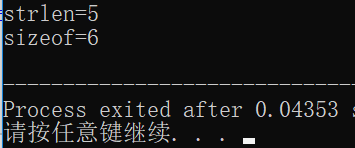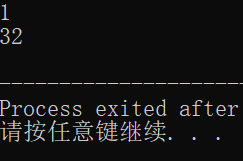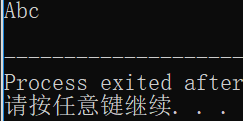一.字符输入输出
putchar
• int putchar(int c);
• 向标准输出写一个字符
• 返回写了几个字符,EOF(-1)表示写失败
getchar
• int getchar(void);
• 从标准输入读入一个字符
• 返回类型是int是为了返回EOF(-1)
• Windows—>Ctrl-Z
• Unix—>Ctrl-D
#include <stdio.h> int main(int argc,char const *argv[]) { int ch; while ( (ch = getchar()) != EOF ){ //输入int类型 putchar(ch); //输出int类型 } printf("EOF "); //ctrl+z 输出 return 0; }
二.标准库中的字符串函数
string.h
• strlen
• strcmp
• strcpy
• strcat
• strchr
• strstr
strlen
• size_t strlen(const char *s);
• 返回s的字符串长度(不包括结尾的0)
#include <stdio.h> #include <string.h> size_t mylen(const char* s) //用函数来代表strlen { // int cnt = 0; int idx = 0; while (s[idx] != '�'){ idx++; // cnt++; } return idx; } int main(int argc, char const *argv[]) { char line [] = "Hello"; printf("strlen=%lu ",strlen(line));//返回字符长度 printf("sizeof=%lu ",sizeof(line)); //还要算上最后的0 return 0; }

strcmp
• int strcmp(const char *s1, const char *s2);
• 比较两个字符串,返回:
• 0:s1==s2
• >0:s1>s2
• <0:s1<s2
#include <stdio.h> #include <string.h> int mycmp(const char* s1, const char* s2) { int idx = 0; while ( s1[idx] == s2[idx] && s1[idx] !='�'){ // if ( s1[idx] != s2[idx] ) { // break; // }else if ( s1[idx] =='�') { // break; // } idx ++; } return s1[idx] - s2[idx]; } int main(int argc, char const *argv[]) { char s1[] = "abc"; char s2[] = "Abc"; printf("%d ",strcmp(s1,s2)); printf("%d ",'a'-'A'); return 0; } // while ( *s1 ==*s2 && *s1 != '�'){ // s1++; // s2++; // } // return *s1 - *s2;

strcpy
• char * strcpy(char *restrict dst, const char *restrictsrc);
• 把src的字符串拷贝到dst
• restrict表明src和dst不重叠(C99)
• 返回dst
• 为了能链起代码来
#include <stdio.h> #include <string.h> char* mycpy(char* dst,const char* src) { int idx=0; while (src[idx] !='�'){ //数组版本 实现 dst[idx]=src[idx]; idx ++; } dst[idx] = '�'; return dst; } int main(int argc, char const *argv[]) { char s1[] = "abc"; char s2[] = "Abc"; strcpy(s1,s2); return 0; } // char* ret =dst; // while(*src){ //指针版本实现 // *dst++=*src++; // dst++; // src++; // } // *dst = '�'; // // return ret;

复制一个字符串
char *dst = (char*)malloc(strlen(src)+1);
strcpy(dst, src);
strcat
• char * strcat(char *restrict s1, const char *restrict s2);
• 把s2拷贝到s1的后⾯面,接成一个长的字符串
• 返回s1
• s1必须具有足够的空间
#include <stdio.h> void strcmpmyself(char str1[1000],char str2[1000]) { int i,j ; for(i=0;str1[i]!='�';i++); for(j=0;str2[j]!='�';j++) str1[i+j]=str2[j]; } int main() { char str1[1000],str2[1000]; printf("请输入字符串1:"); gets(str1); printf("请输入字符串2:"); gets(str2); strcmpmyself(str1,str2); printf("连接后的字符串为:%s",str1); return 0 ; } //int main(int argc, char const *argv[]) //{ // char s1[] = "abc"; // char s2[] = "Abc"; // printf("%s ",strcat(s1,s2)); // // return 0; // }
@strcpy和strcat都可能出现安全问题,目的地址没有足够空间就会出现问题。
安全版本
• char * strncpy(char *restrict dst, const char *restrict src, size_t n);
• char * strncat(char *restrict s1, const char *restrict s2, size_t n);
• int strncmp(const char *s1, const char *s2, size_t n);
字符串中找字符
• char * strchr(const char *s, int c);
• char * strrchr(const char *s, int c);
• 返回NULL表⽰示没有找到
• 如何寻找第2个?
#include <stdio.h> #include <string.h> //int main(int argc,char const *argv[]) //{ // char s[] ="hello"; // char *p = strchr(s,'l'); //// p = strchr(p+1,'l'); // char *t =(char*)malloc(strlen(p)+1); //字符长度+1 // strcpy(t,p); // // printf("%s ",p); // free(t); //释放内存 // return 0; //} int main(int argc,char const *argv[]) { char s[] ="hello"; char *p = strchr(s,'l'); char c =*p; // 取出he *p = '�'; char *t = (char*)malloc(strlen(s)+1); strcpy(t,s); printf("%s ",t); free(t); //释放内存 return 0; }